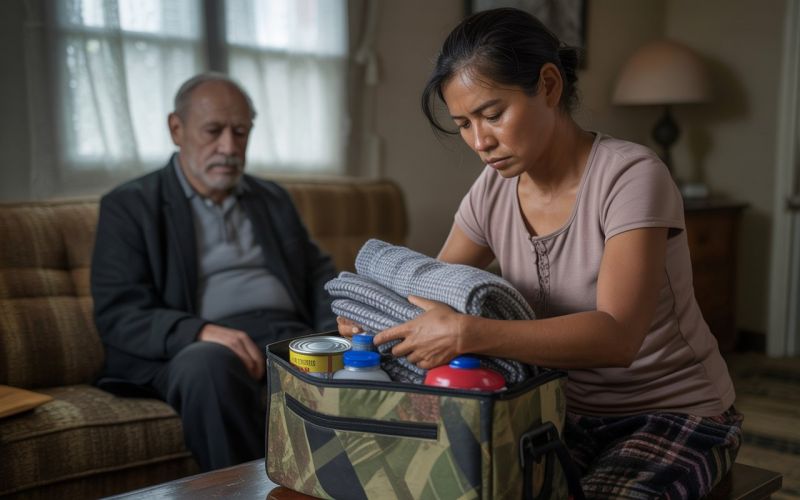Your At-Home War-Time Kit: Everything a Caregiver Should Have Ready
iSavta | 20.06.2025

Dear Caregiver,
Living in Israel during war or conflict is not easy. It can be scary and stressful. But you can stay safer by being ready. One important way to prepare is to make your own at-home war-time kit. This kit will help you take care of yourself and the elderly person you are caring for in case of an emergency.
Here is a simple guide to help you make your own kit.
What is a War-Time Kit?
A war-time kit is a bag or box with all the important things you may need during a rocket attack, sirens, or long power cuts. You should keep this kit in a place that is easy to reach — like near the safe room or shelter (mamad).
Things to Put in Your Kit
Here are the things you should include in your war-time kit:
1. Water and Food
-
3–4 bottles of clean drinking water
-
Easy-to-eat food like canned goods, crackers, energy bars, or dry fruit
-
Food for your employer (especially if they have a special diet)
-
A small manual can opener (no electricity needed)
2. Medicines
-
All daily medicines for you and your patient (at least for 3–5 days)
-
List of medicines and doses
-
First aid kit (band-aids, alcohol, cotton, pain relievers, etc.)
3. Documents
-
Passport or visa copy (in case you lose the original)
-
Patient’s ID or health card
-
Emergency contact list (your employer’s family, your agency, friends)
-
Some cash (small bills)
4. Clothing and Personal Items
-
Extra clothes and underwear
-
Warm blanket or shawl
-
Diapers (if your patient uses them)
-
Wet wipes and tissues
-
Flashlight (with extra batteries)
-
Phone charger and power bank
5. Entertainment and Comfort
-
Book, magazine, or puzzle to pass the time
-
Earplugs if the sirens are too loud for your patient
-
A small toy or music if it helps calm your elderly
Special Tips for Caregivers
-
Stay calm. Your elderly patient will feel safer if you stay calm.
-
Practice the alarm drill. Know how much time you have when the siren sounds. Practice walking or pushing a wheelchair to the mamad.
-
Keep the kit updated. Check every month. Replace expired food or medicine.
-
Stay informed. Follow updates from your employer, news, or trusted Facebook caregiver groups.
What If There Is No Shelter in the House?
-
If there is no mamad (safe room), go to the nearest stairwell or room with no windows.
-
Try to protect your patient’s head. Use pillows or a blanket if needed.
You Are Not Alone
We know this is a very hard time. But remember, you are not alone. Many caregivers like you are going through the same experience. Keep in touch with your friends, other caregivers, or your agency. Talk to someone if you feel scared or anxious.
Be ready. Stay safe. Take care of yourself, too.
Your safety is important — not just for you, but for the elderly person who depends on you every day.
Read more about Personal Wellness

Personal Wellness
Making 2026 a Successful Year as a Migrant Caregiver: Simple Steps That Truly Matter
Read More
Personal Wellness
New Year Away From Home: How Migrant Caregivers in Israel Can Find Meaning, Hope, and Strength in 2026
Read More
Personal Wellness
Celebrating Christmas in Israel: Simple Ways to Feel the Holiday Spirit Even When People Around You Don’t Celebrate
Read More
Personal Wellness







